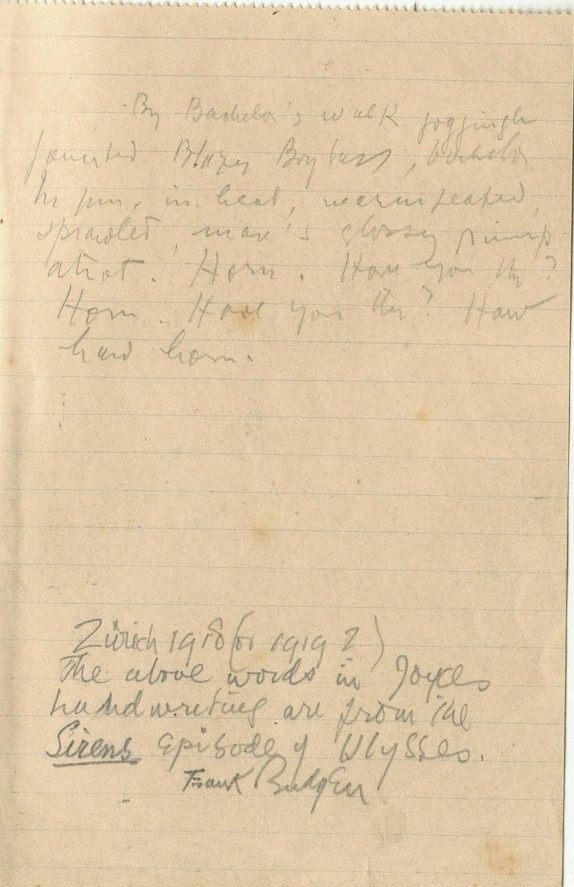【Drunken Woman Pickup Sex】
Document: Happy Birthday,Drunken Woman Pickup Sex James Joyce
Arts & Culture

Image courtesy Glenn Horowitz Bookseller, Inc.; document now part of a private Joyce collection in New York.
There’s so much to celebrate today, February 2, the birthday of James Joyce. On January 1 of this year the published works of Joyce came into the public domain. What does this mean? It means that scholars no longer need to go to his grandson Stephen Joyce, bowl in hand, begging for a ladle full of text. It means that I can translate for you the above illegible bit of manuscript from Ulyssesin Joyce’s hand:
By Bachelor’s walk jogjingle
jaunted Blazes Boylan, bachelor.
In sun, in heat, warmseated,
sprawled, mare’s glossy rump
atrot. Horn, Have you the ?
Horn. Have you the ? Haw
haw horn.
Clearer? Good.
Even better, it also means that I can quote you the slightly different published version of this passage:
By Bachelor’s walk jogjaunty jingled Blazes Boylan, bachelor, in sun, in heat, mare’s glossy rump atrot with a flick of whip, on bounding tyres: sprawled, warmseated, Boylan impatience, ardentbold. Horn. Have you the ? Horn. Have you the ? Haw haw horn.
You see the improvement? Excellent.
The irony of Stephen Joyce’s virtual censorship of the work of a man continually at odds with the censors himself has not gone unnoted—especially because Joyce reveled in the thought of perplexing scholars for generations to come. (The censorship that afflicted—if not made—Joyce’s career is also tinged with irony: who among the hormonal pubescent lads you know would have the patience and determination to locate, let alone reread, the dirty bits?)
You may recognize this snatch of text from the eleventh chapter of Ulysses, the Sirens episode. Frank Budgen confirms this in his note at the foot of the page: “Zurich 1918 (or 1919?) The above words in Joyce’s handwriting are from the Sirens episode of Ulysses. Frank Budgen.” Budgen, a friend of Joyce from their shared time in Zurich during WWI, was his frequent reader for working manuscripts, including Ulysses and Finnegans Wake. In 1929 he contributed an essay to Our Examination Round His Factification for Incamination of Work in Progress, a collection of commentary on FinnegansWake prepared by Joyce’s publisher Sylvia Beach—founder of Paris’s Shakespeare & Co.—far in advance of its 1939 release. In 1934, Budgen published James Joyce and the Making of Ulysses; and nearly fifteen years after Joyce’s death, his Further Recollections of James Joyce was published as a pamphlet.
Joyce was born on February 2, 1882. By his thirties, when he wrote out this bit of text in an illegible hand, his eyesight had been virtually destroyed by glaucoma and synechia, retinal diseases that could lead to blindness even when treated, as his was, with repeated surgery and the application of leeches around the eyes. The best known images of Joyce show him in his signature thick-lensed glasses, usually looking away from the camera—away from the light. He would write to his brother in 1925 after another operation: “The pain was very great but I got over it with morphine,” opining that the next operation would be “the sixth in a year and nine months and I am very tired of it,” but that he was hopeful it would restore his sight. It did not; his eyesight, and his handwriting, never improved.
Richard Ellmann, Joyce biographer and editor of the three volume Letters, elaborates as to how the author got by: “His method was to write a series of phrases down, then, as the episode took form, to cross off each one in a different colored pencil to indicate where it might go. Surprisingly little was omitted, but no one looking at the notesheets could have predicted how the fragments would coalesce.” This leaf, bearing no such markings, fell into a category of material Joyce himself explained in 1917 to Claud W. Sykes, one of the typists who would diligently, arduously work from his manuscripts, including some of those from the Sirens episode: “I make notes on stray bits of paper which I then forget in the most unlikely places, in books, under ornaments and in my pockets and on the back of advertisements.” We look forward to the discovery of more of these bits, and to seeing them shared.
Sarah Funke Butler is a literary archivist and agent at Glenn Horowitz Bookseller, Inc.
Search
Categories
Latest Posts
Today's Hurdle hints and answers for May 12, 2025
2025-06-26 05:11When are we going to get honest
2025-06-26 04:45Q&A with tendercare founder and CEO Shauna Sweeney
2025-06-26 02:46Popular Posts
Amazon Pet Day: All the best deals
2025-06-26 05:01NASA's Opportunity rover is braving an extreme dust storm on Mars
2025-06-26 04:07Dyson V8 Plus cordless vacuum: $120 off at Amazon
2025-06-26 03:21Featured Posts
Amazon Prime Grubhub deal: Save $10 off orders of $20 or more
2025-06-26 04:53Byton's new electric sedan concept car is even flashier than its SUV
2025-06-26 04:52All the best trailers from Nintendo's E3 2018 showcase: Watch
2025-06-26 04:32Keeping Hope Alive
2025-06-26 03:01Popular Articles
NYT Strands hints, answers for May 18
2025-06-26 05:13All the best trailers from Nintendo's E3 2018 showcase: Watch
2025-06-26 03:54Ireland fines TikTok $600 million for sharing user data with China
2025-06-26 03:11Newsletter
Subscribe to our newsletter for the latest updates.
Comments (64464)
Steady Information Network
NYT mini crossword answers for May 9, 2025
2025-06-26 05:05Progress Information Network
Telltale Games is working on a 'Stranger Things' adventure game
2025-06-26 05:03Unique Information Network
6 new features in 'Assassin's Creed: Odyssey'
2025-06-26 04:57Unobstructed Information Network
A Disney princess showed up on 'Westworld'
2025-06-26 03:55Fashion Information Network
The best day to book your flight, according to Google
2025-06-26 03:22